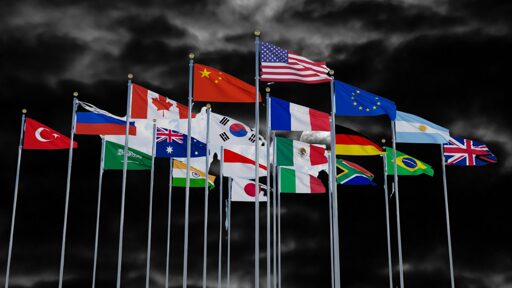Multilateralism is in tatters. Instead of rules-based, consensus agreements, global economic relations have largely devolved into one-on-one arm-twisting and name-calling, alternating with fawning sycophancy and lavish personal gifts. In recent negotiations with Asian leaders, President Trump scored a gold golf ball, a gold crown, and a gold-flecked dessert.
In a world already divided by extreme inequalities, the collapse of multilateralism makes it even more likely that the most powerful players — the largest economies and the wealthiest corporations and individuals — will score the best deals. Small countries and ordinary people, from Iowa soybean farmers and Mexican factory workers to digital service consumers in Cambodia, are even more likely to get the shaft.
The G20 is a space that was intended to catalyze multilateral action. In fact, it touts itself as the “the premier forum for international economic cooperation,” and it is the one place where leaders of the world’s largest economies sit down together at least once a year for face-to-face dialogue.
South Africa will host this year’s G20 summit from November 22 to 23, and the United States will host the next one in December 2026. Do we have any reason to think this forum holds potential for not only restoring multilateralism but also advancing a more equitable global economy?
This is a question I’ve grappled with over the past several months as part of a team of analysts from the UK, Brazil, South Africa, and other countries. In our new joint report, The G20 at a Crossroads, we document a few examples of decisive actions this body has taken during its nearly two decades of existence.
In the midst of the financial crisis that erupted in 2008, for instance, labor unions and others successfully lobbied G20 leaders to adopt coordinated stimulus measures that helped avoid a depression-level global collapse.
In response to the Covid-19 pandemic, the G20 approved of at least some debt relief for low-income countries and authorized $650 billion in financial aid in the form of “special drawing rights,” the largest-ever allocation of this IMF-created international reserve asset.
These actions were far from perfect. Governments prematurely aborted the stimulus programs they adopted after the 2008 crash in favor of austerity budgets that deepened and prolonged economic crises.
Pandemic support programs were woefully insufficient for the poorest countries and failed to prevent many of them from sinking even further into debt. Between 2019 and 2023, Sub-Saharan Africa’s total external debts increased from $747 billion to $864 billion while the number of global billionaires grew from 2,153 to 2,640. Overall, 3.4 billion of the world’s people live in countries that spent more money in the years 2021-2023 servicing their foreign debts than on public education or health.
What can we learn from these examples? G20 leaders obviously have the power to mobilize vast resources, but the few times they’ve used this power, the focus has largely been on containing market crises to protect the interests of the wealthiest creditors and investors rather than improving the lives of the most vulnerable.
And so while we need to push for renewed multilateralism, we cannot be satisfied with a return to old models. We need new approaches that go beyond crisis management to build a more resilient, sustainable, and just global economy for the long term.
To achieve this, the G20 must tackle what we describe in our report as the “lived crises of our time” — the daily realities of extreme droughts, food insecurity, unaffordable housing, precarious work, debt traps, and forced displacement.
Decades of neglecting these threats to global stability has undercut the welfare of people in both the Global North and South. High levels of poverty and unemployment in the developing world, for example, weaken the bargaining power of U.S. workers who are competing in a global labor pool.
Climate change, obviously, knows no boundaries. And skyrocketing inequality is fueling political polarization, authoritarianism, and xenophobia around the world, as elites deflect blame onto migrants and other convenient scapegoats instead of confronting structural failures.
Last year, the Brazilian presidency took important steps towards broadening the G20 agenda. Through diplomacy, sustained civil society engagement, and collaboration with innovative academics, they elevated critical proposals for clean energy financing, taxing extreme wealth, and valuing care work. And while they did not secure G20-wide cooperation on these fronts, their efforts gave a boost to campaigns in numerous countries for increasing taxes on billionaires and ensuring decent pay for caregivers and affordable care for those who need it.
“Wherever we live, we all want the same things — a secure place to live, a healthy environment, the ability to care for our loved ones, and the chance to plan for our future,” notes our lead report author, Fernanda Balata, of the New Economics Foundation.
With political will and a commitment to cooperation, G20 leaders have the power to deliver these basic elements of a dignified life to billions of people.
Sarah Anderson directs the Global Economy Project at the Institute for Policy Studies in Washington, DC.
The post Can the G20 Do More Than Serve Markets and Investors? appeared first on Inequality.org.
From Inequality.org via this RSS feed


